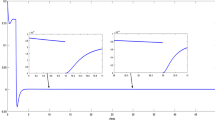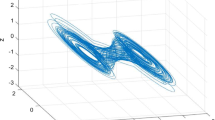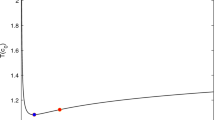Abstract
The problem of estimator design for stochastic discrete-time semi-Markov jump neural networks (NNs) with both quantization and mixed time delays is addressed. The asymptotic stability criteria are acquired by setting up an appropriate Lyapunov functional using the summation inequalities in both single and double forms for the semi-Markov jump networks. Making use of Lyapunov functional technique, the explicit expressions for the gain are proposed. Eventually, two examples are exploited numerically to exemplify the usefulness of the new methodology.


Similar content being viewed by others
References
Niculescu SI, Gu K (2006) Advances in time delay systems. Springer, Germany
Rutkowski L (2004) Adaptive probabilistic neural networks for pattern classification in time-varying environment. IEEE Transactions on Neural Netw 15:811–827
Xia Y, Wang J (2004) A general projection neural network for solving monotone variational inequalities and related optimization problems. IEEE Trans Neural Netw 15:318–328
Gao H, Chen T (2007) New results on stability of discrete-time systems with time-varying state delay. IEEE Trans Autom Control 52:328–334
Maharajan C, Raja R, Cao J, Rajchakit G, Alsaedi A (2018) Novel results on passivity and exponential passivity for multiple discrete delayed neutral-type neural networks with leakage and distributed time-delays. Chaos, Solitons Fractals 115:268–282
Cao J, Rakkiyappan R, Maheswari K, Chandrasekar A (2016) Exponential \(H_{\infty }\) filtering analysis for discrete-time switched neural networks with random delays using sojourn probabilities. SCIENCE CHINA Technol Sci 59:387–402
Rakkiyappan R, Maheswari K, Sivaranjani K (2017) Non-weighted state estimation for discrete-time switched neural networks with persistent dwell-time switching regularities based on Finsler’s lemma. Neurocomputing 260:131–141
Zhang J, Wang Z, Ding D, Liu X (2015) \(H_{\infty }\) state estimation for discrete-time delayed neural networks with randomly occurring quantizations and missing measurements. Neurocomputing 148:388–396
Sun Y, Li L, Ho DWC, Quantized Synchronization Control of Networked Nonlinear Systems: Dynamic Quantizer Design With Event-Triggered Mechanism, IEEE Transactions on Cybernetics, https://doi.org/10.1109/TCYB.2021.3090999.
Li L, Sun Y, Lu J, Cao J (2022) Dynamic Quantization Driven Synchronization of Networked Systems Under Event-Triggered Mechanism. IEEE Trans Circuits Syst I Regul Pap 69:1728–1740
Li Z, Chang X, Du X, Yu L (2016) \(H_{\infty }\) control of discrete-time uncertain linear systems with quantized feedback. Neurocomputing 174:790–794
Qu F, Guan Z, He D, Chi M (2015) Event triggered control for networked control systems with quantization and packet losses. J Franklin Institute 352:974–986
Wu Z, Shi P, Su H, Chu J (2013) Dissipativity analysis for discrete-time stochastic neural networks with time-varying delays. IEEE Transactions Neural Netw and Learning Syst 24:345–355
Kwon O, Park J (2004) On improved delay-dependent robust control for uncertain time-delay systems. IEEE Trans Autom Control 49:1991–1995
Kwon O (2011) Stability criteria for uncertain stochastic dynamic systems with time-varying delays,. Int J Robust Nonlinear Control 21:338–350
Fridman E, Shaked U (2005) Stability and guaranteed cost control of uncertain discrete delay systems. Int J of Control 78:235–246
He Y, Wang QG, Xie L, Lin C (2007) Further improvement of free-weighting matrices technique for systems with time-varying delays. IEEE Trans Autom Control 52:293–299
Zhang B, Xu S, Zou Y (2008) Improved stability criterion and its application in delayed controller design for discrete-time systems. Automatica 44:2963–2967
Shao H, Han QL (2011) New stability criteria for linear discrete-time systems with interval-like time-varying delays. IEEE Trans Autom Control 56:619–625
Nam PT, Pubudu PN, Trinh H (2015) Discrete Wirtinger-based inequality and its application. J Franklin Institute 352:1893–1905
Ding D, Wang Z, Shen B, Dong H (2015) Event-triggered distributed \(H_{\infty }\) state estimation with packet dropouts through sensor networks. IET Control Theory Applications 9:1948–1955
Jia X, Chi X, Han Q, Zheng N (2014) Event-triggered fuzzy \(H_{\infty }\) control for a class of nonlinear networked control systems using the deviation bounds of asynchronous normalized membership functions. Inf Sci 259:100–117
Li L, Ho DWC, Xu S (2014) A distributed event-triggered scheme for discrete-time multi-agent consensus with communication delays. IET Control Theory Applications 8:830–837
Li Q, Shen B, Liu Y, Alsaadi FE (2016) Event-triggered \(H_{\infty }\) state estimation for discrete-time stochastic genetic regulatory networks with Markovian jumping parameters and time-varying delays. Neurocomputing 174:912–920
Zheng J, Qui B (2018) State estimation of chaotic Lurie system with logarithmic quantization. Chaos, Solitons Fractals 112:141–148
Zhang W, Wang Z, Liu Y, Ding D, Alsaadi FE (2017) Event-based state estimation for a class of complex networks with time-varying delays: A comparison principle approach. Physica Letter A 381:10–18
Wang L, Wang Z, Wei G, Alsaadi FE (2018) Finite-state estimation for recurrent delayed neural networks with component based event-triggering protocol. IEEE Trans Neural Netw Learn Syst 29:1046–1057
Liu H, Ho DWC, Sun F (2008) Design of \(H_{\infty }\) filter for Markov jumping linear systems with non-accessible mode information. Automatica 44:2655–2660
Xiong J, Lam J, Gao H, Ho DWC (2005) On robust stabilization of Markovian jump systems with uncertain switching probabilities. Automatica 41:897–903
Hou Z, Luo J, Shi P, Nguang SK (2006) Stochastic stability of Itô differential equations with semi-Markovian jump parameters. IEEE Transactions on Automatomatic Control 51:1838–1842
Shmerling E, Hochberg KJ (2008) Stability of stochastic jump-parameter semi-Markov linear systems of differential equations. Stochastics 80:513–518
Zhang X, Hou Z (2012) The first-passage times of phase semi-Markov processes. Statistics in Probability Letters 82:40–48
Seuret A, Gouaisbaut F, Fridman E (2015) Stability of discrete-time systems with time-varying delays via a novel summation inequality. IEEE Trans Autom Control 60:2740–2745
Hein LV, Trinh H (2016) New Summation inequalities and their applications to discrete-time delay systems. Automatica 71:197–201
Zhang CK, He Y, Jiang L, Wu M (2016) An improved summation inequality to discrete-time systems with time-varying delay. Automatica 74:10–15
Zhang W, Yu L, Song H (2009) \(H_{\infty }\) filtering of networked discrete-time systems with random packet losses. Inf Sci 179:3944–3955
Nam PT, Trinh H, Pathirana PN (2015) Discrete inequalities based on multiple auxiliary functions and their applications to stability analysis of time-delay systems. Journal of Franklin Institute 352:5810–5831
Chen J, Lu J, Xu S (2016) Summation inequality and its applications to stability analysis for time-delay systems. IET Control Theory Appl 10:391–395
Wu ZG, She P, Su H, Chu J (2011) Passivity analysis for discrete-time stochastic Markovian jump neural networks with mixed time delays. IEEE Transc. on Neural networks 22:1566–1575
Liu Y, Wang Z, Liu X (2009) Asymptotic stability for neural networks with mixed time-delays: the discrete-time case. Neural Netw 22:67–74
Zhang J, Ma L, Liu Y (2016) Passivity analysis for discrete-time neural networks with mixed delays and randomly occurring quantization effects. Neurocomputing 216:657–665
Rajchakit G, Saravanakumar R (2016) Exponential stability of semi-Markovian jump generalized neural networks with interval time-varying delays. Neural Comput Appl 29:483–492
Huang J, Shi Y (2013) Stochastic stability and robust stabilization of semi-Markovian jump linear systems. Int J Robust Nonlinear Control 23:2028–2043
Liu X, Ho DWC, Xie C (2020) Prespecified-Time Cluster Synchronization of Complex Networks via a Smooth Control Approach. IEEE Transactions on Cybernetics 50:1771–1775
Liu X, Ho DWC, Song Q, Xu W (2018) Finite/Fixed-Time Pinning Synchronization of Complex Networks With Stochastic Disturbances. IEEE Transactions on Cybernetics 49:2398–2403
Author information
Authors and Affiliations
Corresponding author
Additional information
Publisher's Note
Springer Nature remains neutral with regard to jurisdictional claims in published maps and institutional affiliations.
This work was supported by the National Natural Science Foundation of China under Grant No. 62103103, and the Natural Science Foundation of Jiangsu Province of China under Grant No. BK20210223.
Rights and permissions
About this article
Cite this article
Cao, Y., Maheswari, K. & Dharani, S. Improved Summation Inequality Based State Estimation for Stochastic Semi-Markovian Jumping Discrete-Time Neural Networks with Mixed Delays and Quantization. Neural Process Lett 55, 1919–1935 (2023). https://doi.org/10.1007/s11063-022-10969-5
Accepted:
Published:
Issue Date:
DOI: https://doi.org/10.1007/s11063-022-10969-5




